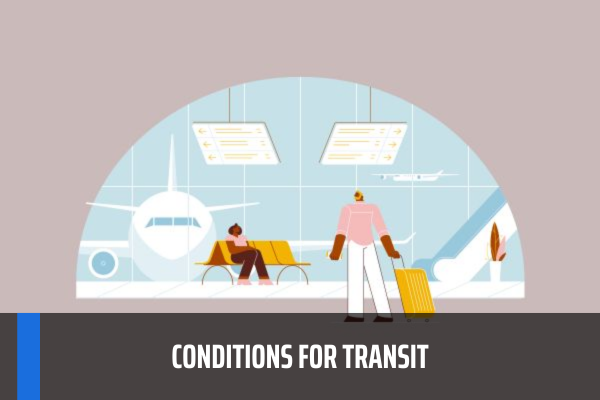What is transit? What are the conditions for transit in Vietnam?
Vietnam: What is transit?
Pursuant to Clause 5, Article 3 of the Law on entry, exit, transit, and residence of foreigners in Vietnam 2014 stipulates as follows:
Interpretation of terms
In this Law, the terms below are construed as follows:
1. Foreigners are those who carry papers proving their foreign nationalities, or those without nationalities who enter, leave, transit through, or reside in Vietnam.
2. Papers proving foreign nationalities are papers issued by foreign authorities or the UN, including passports or passport substitutes (hereinafter referred to as passports).
3. International laissez-passer means a document issued by a competent authority of a country to a person without nationality who is residing therein, and is accepted by Vietnamese authorities.
4. Entry means a foreigner’s entering into Vietnam through a Vietnam’s border checkpoint.
5. Transit means a foreigner’s passing or staying within the area for transit passengers at a border checkpoint of Vietnam before going to a third country.
6. Exit means a foreigner’s leaving Vietnam through a Vietnam’s border checkpoint.
7. Suspension of exit means a decision of competent person of Vietnam to suspend a foreigner residing in Vietnam from leaving Vietnam for a certain period of time.
...
Accordingly, transit means a foreigner’s passing or staying within the area for transit passengers at a border checkpoint of Vietnam before going to a third country.

What is transit? What are the conditions for transit in Vietnam?
What are the conditions for transit in Vietnam?
Pursuant to Article 23 of the Law on entry, exit, transit, and residence of foreigners in Vietnam 2014 has the following provisions:
Conditions for transit
A foreigner shall be granted transit when all of the documents below are presented:
1. A passport or a laissez-passer;
2. A ticket that matches the route to the third country;
3. The visa issued by the third country, except for cases in which visa-free entry is granted.
Accordingly, a foreigner shall be granted transit when all of the documents below are presented:
- A passport or a laissez-passer;
- A ticket that matches the route to the third country;
- The visa issued by the third country, except for cases in which visa-free entry is granted.
What are the prohibited acts regarding entry, exit, transit, and residence of foreigners in Vietnam?
Pursuant to Article 5 of the Law on entry, exit, transit, and residence of foreigners in Vietnam 2014, it is stipulated as follows:
Prohibited acts
1. Obstructing foreigners and relevant entities from exercising their rights or discharging their duties in accordance with regulations of law on entry, exit, transit, and residence of foreigners in Vietnam.
2. Establishing procedures or requiring documents against this Law and relevant regulations of law; harass foreigners when they are following for entry, exit, transit, or residence in Vietnam.
3. Illegal entry, exit, or residence in Vietnam; using fake documents to enter, leave, transit through, or reside in Vietnam.
4. Providing false information or documents in order to obtain permission for entry, exit, transit, or residence in Vietnam.
5. Taking advantage of entry, exit, transit, or residence in Vietnam to act against Socialist Republic of Vietnam, infringe upon the lawful rights and interests of other entities.
6. Buying, selling, leasing, lending, borrowing, falsifying entry/exit/residence permits in order for foreigners to enter, leave, transit through, or reside in Vietnam.
Accordingly, 6 prohibited acts regarding entry, exit, transit, and residence of foreigners in Vietnam include:
- Obstructing foreigners and relevant entities from exercising their rights or discharging their duties in accordance with regulations of law on entry, exit, transit, and residence of foreigners in Vietnam.
- Establishing procedures or requiring documents against this Law and relevant regulations of law; harass foreigners when they are following for entry, exit, transit, or residence in Vietnam.
- Illegal entry, exit, or residence in Vietnam; using fake documents to enter, leave, transit through, or reside in Vietnam.
- Providing false information or documents in order to obtain permission for entry, exit, transit, or residence in Vietnam.
- Taking advantage of entry, exit, transit, or residence in Vietnam to act against Socialist Republic of Vietnam, infringe upon the lawful rights and interests of other entities.
- Buying, selling, leasing, lending, borrowing, falsifying entry/exit/residence permits in order for foreigners to enter, leave, transit through, or reside in Vietnam.
LawNet